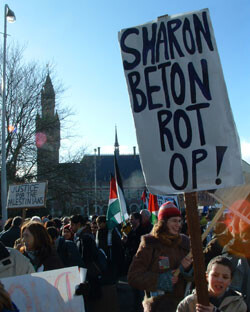The Electronic Intifada 25 February 2004

Pro-Palestinian and anti-wall protesters at the “Plein” in front of the Dutch Parliament on Monday (Photo: Peter Darin/Actieplatform Palestina, 2004)
On the last day of the hearings at the International Court of Justice in The Hague, presiding Judge Shi Jiuyong, declaring a close to the oral hearings said “a date and time for the court to announce its rulings” would be set later. Judge Kooijmans from the Netherlands was not present during today’s hearing.
Opening the final session, Sudan’s ambassador in the Netherlands, Abuelgasim Idris told the Court: “An advisory opinion pronouncing the legal consequences of the construction of the wall shall benefit the prospects for peace by clarifying the law and discouraging unilateral negative actions.”
Abuelgasim Idris, Sudan’s ambassador to the Netherlands, told the opening of the final session. Concluding his remarks, he said that the Court is competent and has jurisdiction to grant an advisory opinion on the legal question submitted by the United Nations General Assembly, and that there are no compelling reasons preventing it from doing so.
“The construction of the wall by Israel in the occupied Palestinian territory is in contradiction of international law, and that it should comply with the United Nations General Assembly’s resolution ES-10/13 of 21 October 2003 to stop and reverse tthe construction of the wall in the occupied Palestinian territory including in and around East Jerusalem. It should also be obliged to make adequate reparations for the damages caused by the construction action,” the ambassador told the panel.

Pro-Palestinian and anti-wall protesters in front of the Peace Palace, the International Court of Justice in The Hague (Photo: Stefan Deconinck/Actieplatform Palestina, 2004)
He continued: “Palestine is not a kind of no-man’s land subject to
appropriation by Israel. It is a self-determination unit in the borders drawn by the armistice lines of 1949. This has been recognized by the Security Council and the General Assembly in binding determinations — and by Israel itself. This is the lex lata, whatever the parties may freely agree upon in the future.” Summing up his statement, Bothe said: “The wall does not stand between terrorists
and potential victims. It stands between the farmer and his land, between the employee and the employer, between the merchant and the client, between the child and its school, between the patient and the doctor, between families who want to unite, between the faithful and his or her Holy Places. As a matter of international law, it does not belong there at all. The Court should clearly state the consequences which these violations of applicable international law entail for various actors.”
Monique Chemillier-Gendreau, a French lawyer, speaking on behalf off the Organization of the Islamic Conference told the Court that “with the wall, a viable Palestine is no longer possible and therefore no peace” is possible. “The wall occupies large areas of summarily confiscated Palestinian territory. It has been abundantly demonstrated that this huge military installation has led to a massive violation of human rights.” She argued that because the wall, “which is a disproportionate response to attacks in themselves unacceptable, the wall is the worst possible response because it is in turn a massive violation of rights and law.”
Chemillier-Gendreau’s presentation was the last of fifteen statements heard by the panel of fifteen judges at the International Court, the U.N.’s highest judicial body, which was requested by the United Nations General Assembly to render an urgent advisory opinion on the legal consequences of the wall.
Concluding the oral proceedings President Shi thanked the delegations who had addressed the Court in the course of the past three days, as well as the participants in the written proceedings. He asked the representatives off all participants to remain at the disposal of the Court in case the Court would need any further information or explanations from them. President Shi then declared the sitting closed. A date and time for the court to announce its rulings will be set later.
Related Links:



